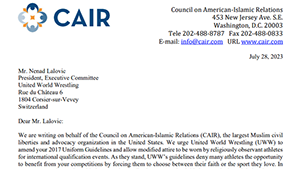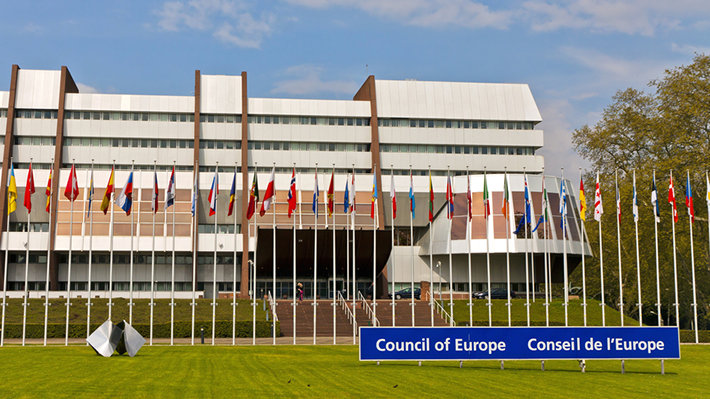
-
HOME
-
WHAT IS STANDOur Mission Our Values Our Help Contact
-
WHAT WE FIGHT FORReligious Freedom Religious Literacy Equality & Human Rights Inclusion & Respect Free Speech Responsible Journalism Corporate Accountability
-
RESOURCESExpert Studies Landmark Decisions White Papers FAQs David Miscavige Religious Freedom Resource Center Freedom of Religion & Human Rights Topic Index Priest-Penitent Privilege Islamophobia
-
HATE MONITORBiased Media Propagandists Hatemongers False Experts Hate Monitor Blog
-
NEWSROOMNews Media Watch Videos Blog
-
TAKE ACTIONCombat Hate & Discrimination Champion Freedom of Religion Demand Accountability
Muslim Inmates Allege Religious Discrimination in Oregon Prison System
Alleging a denial of legally mandated religious accommodations, a Muslim civil rights and advocacy organization has filed a federal lawsuit on behalf of three Muslim men incarcerated at the Eastern Oregon Correctional Institution in Pendleton.

The lawsuit, filed June 30 by the Council on American-Islamic Relations (CAIR), claims the prison violated the inmates’ constitutional rights and federal laws by failing to provide appropriate dietary and worship accommodations. The complaint names the prison superintendent, the director of the Oregon Department of Corrections (ODOC) and three department officials as defendants.
“By denying halal meals and blocking family visitation for Eid—while extending those same accommodations to other religious groups—ODOC is violating both the Constitution and federal law.”
“This case is about equal access to and accommodations for religious practice,” said CAIR Deputy Litigation Director Gadeir Abbas. “Oregon prison officials have no justification for denying Muslim men the ability to eat in accordance with their faith or celebrate their holiest days as other religious communities are permitted to do.”
Like “kosher” in Judaism, Muslim dietary laws require food to be “halal,” meaning permissible under Islamic guidelines and free from pork or alcohol. ODOC’s own regulations state: “The department will satisfy the special religious dietary needs of inmates.”
The complaint also alleges that ODOC denied the men the right to celebrate two major Islamic holidays—Eid al-Fitr, which marks the end of Ramadan, and Eid al-Adha, commemorating the end of the annual pilgrimage to Mecca.
“For years,” the lawsuit states, “defendants have instituted a separate, burdensome regime for incarcerated Muslims that denies them religiously compliant dietary accommodations and meaningful religious holiday observance (including communal prayer, family participation and a shared halal feast) while routinely granting comparable accommodations to incarcerated individuals of other faiths.”
The filing details how the plaintiffs and other Muslim inmates were denied participation in key religious practices and explains how ODOC possesses the institutional capacity to provide these accommodations but has “unjustifiably and persistently refused to do so—causing Plaintiffs significant, ongoing and foreseeable harm.”
According to the lawsuit, ODOC had previously provided halal meals—including a family-style feast of lamb or fish—for the Muslim holidays before the COVID-19 pandemic, but those services have not resumed since.
The plaintiffs are seeking court-ordered relief requiring ODOC to comply with the Constitution and federal law by:
Providing nutritionally sufficient and certified halal meals daily, including during Ramadan, Eid al-Fitr and Eid al-Adha;
Implementing food handling protocols to prevent pork contamination and cross-contact;
Offering certified halal meals to all Muslim inmates upon request;
Restoring family visitation and religious accommodations for Eid in the same manner afforded to other religious groups.
“By denying halal meals and blocking family visitation for Eid—while extending those same accommodations to other religious groups—ODOC is violating both the Constitution and federal law,” said plaintiff attorney Aya Beydoun. “Every faith group deserves equal treatment.”
A representative of STAND League, the leading global coalition exposing bigotry and championing religious freedom worldwide, stated that, “Every person, no matter where they are or what their circumstances, deserves the freedom to practice their faith. Equal rights for members of all religions isn’t just a legal standard—it’s a founding principle of this country.”
STAND League is the leading global coalition exposing bigotry and championing religious freedom worldwide. Through education, advocacy and partnership, STAND promotes religious literacy, demands corporate accountability, advances honest journalism and safeguards equality, justice and human rights for all.





